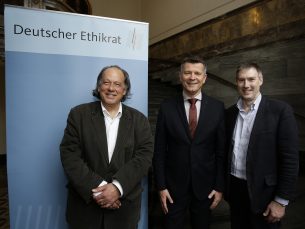04 Apr 2023
0
Members of the ethics advisory councils of Germany, France and the UK, met on 21 October in Berlin to discuss genome editing and its potential uses in a range of applications in plants, animals and humans.
Genome editing, in particular the CRISPR-Cas9 technique, offers powerful and low cost new ways of altering, deleting or inserting DNA in living organisms. It is being used widely in many research areas, and the ethical implications of this are being actively considered by the Deutsche Ethikrat, the Conseil Consultatif Nationale d'Ethique and the Nuffield Council on Bioethics.

The Chairs: Professor Jean-Claude Ameisen, Professor Peter Dabrock, and Professor Jonathan Montgomery
Following their joint meeting in Berlin, the chairs of the respective Councils (Professor Peter Dabrock, Professor Jean-Claude Ameisen and Professor Jonathan Montgomery) agreed that urgent attention needs to be given in respect of a number of key areas, including potential uses in human reproduction, plant and animal farming, and in insects for 'gene drives'.
The three councils are all in the process of carrying out enquiries into various aspects of genome editing, and the Nuffield Council recently published a preliminary report setting out the broad scope of the field, and identifying some of the ethical concerns that it might entail.The chairs agreed that it will be important to encourage wide public debate on these questions, and undertook to keep in close contact as they take their work programmes forward over the coming months.
Share